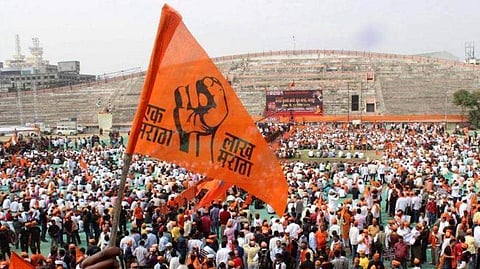

The Supreme Court refused to stay the Maratha quota on Friday and sought a response from the Maharashtra government on a plea challenging the reservation to the community in jobs and education.
The Martha quota was introduced in November 2018. The Bombay High Court upheld it and ordered its implementation.
Maharashtra standing counsel Nishant Katneshwarkar told IANS: "It is a big relief for the government as the apex court did not stay the Maratha quota. And the quota will be applicable from November 2018."
The court refused to give any retrospective effect of the quota before November. The quota will be applicable in connection with reservation in jobs and educational institutions.
A bench headed by Chief Justice Ranjan Gogoi also issued notice returnable in two weeks wherein the parties will file more documents. This observation came as the court agreed to hear an appeal for quashing the reservation for Marathas for admission in educational institutions and government jobs and then issued notice to the Maharashtra government.
The court order came on pleas by two individuals, Jaishri Laxmanrao Patil and Sanjeet Shukla. They argued that the Maratha reservation breached the 50 per cent ceiling set by the apex court for quotas in each state and the High Court had overlooked certain fundamental and legal clauses.
The pleas claimed that the state does not have the authority or law to create a class like Maratha as a separate socially and educationally backward class.
The counsels for the petitioners contended that expanding the ambit of reservation was under the authority of the Centre and not the state government. Therefore, the reservation will require a constitutional amendment.
Earlier, the top court had agreed to hear a petition challenging s Bombay High Court judgment, allowing reservations for Marathas in jobs and educational institutions. The matter was scheduled for hearing on Friday.
The Bombay High Court in June upheld the validity of the reservations granted to the Maratha community under the Socially and Educationally Backward Class (SEBC) category but reduced the quantum from 16 per cent.
Bringing down the quota to 12 per cent in education and 13 per cent in jobs, it observed that the higher quota was "not justifiable".
A Division Bench of Justices Ranjit More and Bharati Dangre also said that the government was entitled to create a separate category for SEBCs and grant them reservations.
The verdict came on a bunch of petitions challenging the state government's November decision granting 16 per cent reservation to the Maratha community under the SEBC category.
In his initial reaction, Chief Minister Devendra Fadnavis welcomed the court verdict and indicated that the new quota percentages recommended were acceptable to the government.
Vijayalaxmi Khopade, the lawyer for one of the petitioners, said the court also endorsed the report of the nine-member M.G. Gaikwad Commission classifying the Marathas as a "Socially and Educationally Backward Class".
